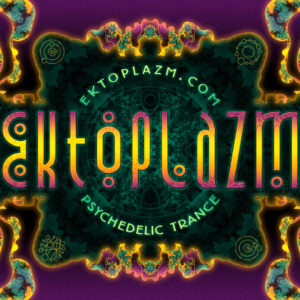
Auxiliary Magazine is an alternative fashion, music, and lifestyle publication based in the United States. Back in March both Ekoplex and I were interviewed by Digitalgeist (Alex Kourelis) for an article entitled “My Label is the Internet,” a feature on netlabels. You can find the finished article on page 27 of the April 2009 issue. Additionally, Auxiliary has been publishing the original interviews on their web site.
Here is the full text of my interview with Alex:
Hi Alexander, Lets get right into it. What brought Ektoplazm into existence?
I relaunched Ektoplazm in 2006 in order to explore a number of revolutionary ideas about music distribution, social media, and technology. Of course, many others have done the same thing in recent years–but I was interested in taking these concepts and fitting them to the specific needs of a niche market, namely the global psychedelic trance counterculture. Motivated by concern for the creative vitality of the movement, I set out to develop a viable alternative to the commercial distribution system. The problem, in a nutshell: psytrance is a very small industry. With decreased physical media sales most of the labels have become very risk-averse; they simply can’t afford to take a chance releasing music that doesn’t fit a particular template. New and unusual producers have an inordinately difficult time breaking into this market–and we, as listeners, lose out. To address some of these concerns I set out to open up a new frontier: free music done in a professional way, maximizing exposure for the artists while providing the highest quality digital media to an ever-growing international audience.
From your perspective, is technology like BitTorrent file sharing a threat?
No, not at all. Technologies like BitTorrent are an opportunity, not a threat. It is the task of business leaders to innovate and adapt to changing market conditions, not dictate terms to their customers. Creative and cultural industries have been turned upside down by the ease and convenience of file-sharing but those industries were in dire need of renewal. In the new economy of abundance, where media objects are infinitely copyable, any business models based on guilt trips, digital rights management, or other pointless stopgap measures are ultimately doomed. Why fight against the inevitable? It is a better use of time and energy to invest in the future.
Does the traditional model of promote-release-tour apply to you and your artists?
Years ago a band would tour to support an album. Now it’s the other way around: bands release albums, generate interest, and then go on tour. Although physical media sales are down, fans are more than willing to pay for unique real-time experiences. When you have fans you can draw a crowd–exactly what every promoter wants. The challenge, then, is to earn fans–not sell records. Charging for access to your music is very limiting if you aren’t already established. Of course, the opposite is true: professional-grade free releases are incredibly empowering to the artist interest in building an audience. Ekoplex is the biggest success story so far; after the debut of his full-length album he received numerous invitations to play at parties and festivals across North America and in Europe. There is great promise to this approach.
Apart from an online presence, is there a consideration for physical products as well?
Physical products are important as long as there is a division between online and offline spheres of activity. That division is growing increasingly thin with every passing year but it still presents a barrier to the direct exchange of cultural goods. What do we do online? We send links. In the real world we pass on (or sell) physical goods. When you try to perform one of these acts in the wrong domain it doesn’t work very well–people don’t pay attention or don’t remember. Now, things are moving very quickly in our society. We probably aren’t far from a day where we all carry personal media devices (like the iPhone, for instance) that allow for streamlined and effortless file sharing, but we’re not quite there yet. Until that happens physical media will still serve a purpose. Well, assuming people still use CDs–many don’t.
Ektoplazm is unusual in that we sell CD versions of every release we do. This is accomplished through an on-demand manufacturing service that prints as many copies as are needed–with no minimum order. Unsurprisingly, few are sold online–but I have personally sold a fair number of CDs at parties and festivals. Some people like to have a copy for their car, a few buy CDs just to support the concept, others don’t bother with downloading, and I have even met a few people without Internet access, shockingly enough.
There is one more benefit to physical media that I would mention: prestige. Since Ektoplazm is actively seeking out bookings for our artists it is important to make a strong impression, particularly with promoters. Anyone with an inbox knows how much junk there is out there–but how often do you ignore a package on your doorstep? Physical media informs potential customers that you’re serious about what you do.
How closely do you follow other netlabels offering similar material? Are they competition or allies?
Ektoplazm is both a netlabel and a free music portal; I both produce and aggregate content, some of which comes from distribution partners like Digital Diamonds (Germany), PAR-2 Productions (Japan), or SunStation (Russia). I closely follow what is happening with free music in the psytrance scene and step in to cross-promote what I feel is the best of it. A year ago I had no trouble keeping up with new releases but nowadays it has grown difficult–enough people have seen the value of the concept and interest is really beginning to skyrocket. Still, I have my methods for filtering out those who aren’t serious. For instance, if I don’t see a lossless download option I won’t bother downloading at all.
Competition in a free marketplace is an interesting thing. We’re competing for attention, essentially. And there is no shortage of it to go around. With that said, I am not really sure if Ektoplazm has any real competitors at the moment. I’ve not seen a site just like mine. There are other psytrance netlabels doing good work but I prefer to partner with them–to bring them into the fold. In the end, we all benefit. Even the commercial labels! What I find really interesting is how Ektoplazm has gone viral. People share the link all over the place. As a result, all sorts of people are discovering psytrance for the first time through my site. Nothing promotes a music-based subculture quite so effectively as free music!
If money and economics were not an issue, what would change with the label?
Now that’s a real game-changer! Money imposes all kinds of restrictions on the way Ektoplazm is designed to operate. Remove those restrictions and everything could change. I would be able to jump into things full-time, redesign the site from the ground up to be a little more community-oriented, work with a wider range of artists, outsource the drudgery, and increase overall productivity. I would still want to work on a non-profit basis though; legitimizing free music really is my calling! And if I could work on Ektoplazm all the time instead of just in my spare moments, well—I provide no assurances of what might come of it, but I am sure it would be big!
The full text of Alex’s interview with Ekoplex is now available here.








Xander,
I really admire the work you are doing with the Ektoplazm netlabel, your free music portal, and supporting the psychedelic trance community. Your professionalism and the eloquence you present certainly a test to the many hours of hard work and careful thought you put into what you do. As a DJ, I often play music that you’ve shared with our community and I really just wanted to say thank you! I hope Ektoplazm continues to grow and flourish in the future, like it has supported and nutured our community thus far.
Moxy